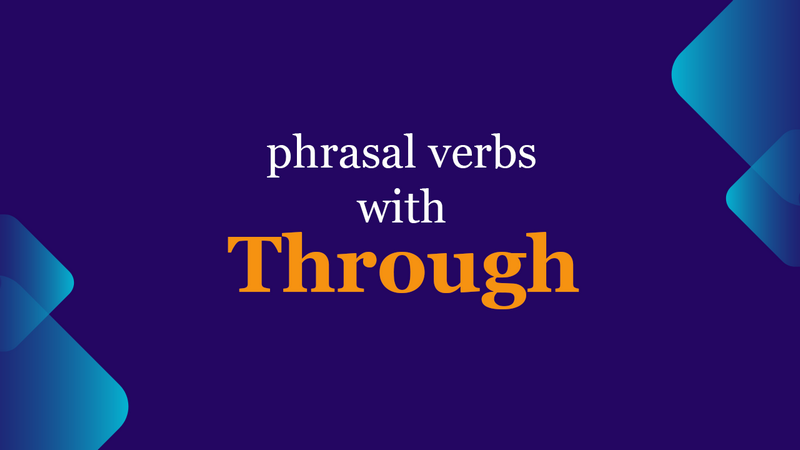💡At a Glance
| Phrasal Verb | Meaning | Example |
| walk through | move in one side and out of the other side of something | Let’s walk through the park. |
| work through / talk through | from the start of something to the end of it | I’ll have to work through my lunch break. |
| look through / check through | doing something from beginning to end with care and consideration | Can you look through these documents? |
| run through | explain something (like a process) to someone | Can you run through this quickly? |
| go through | experience a bad/difficult time | He’s going through a divorce. |
| get through | successfully pass a bad/difficult time | You’ll get through this! |
| follow through | deliver on a promise/commitment | She never follows through on her promises. |
| fall through | plan or business deal fails suddenly | The car deal fell through. |
1. Walk Through
At its most basic, the word “through” is to move from one side of something to the other in the middle, rather than over, under, or around it. For example, you might say, “Let’s walk through the park,” if you want to take a shortcut by going directly from one side of the park to the other, rather than walking around it.
You can change the verb before “through” to show how something or someone moves from one point to another. For example:
- Let’s run through the park.
- Let’s dance through the park.
2. Work Through / Talk Through
“To work through” or “to talk through” can mean to do something from the beginning to the end.
Example sentences:
- I’m going to have to work through my lunch break.
- They were talking through the movie.
Here the phrasal verbs show the action takes place during the entirety of the process. Also, notice with these phrasal verbs you cannot separate the verb and “through”:
I’m going to have to work my lunch break through.
3. Look Through / Check Through / Read Through
“Through” can also mean doing something carefully or thoroughly from start to finish. If you’ve read my post on “Phrasal Verbs with OVER,” this usage is similar in meaning.
- Can you look through these documents and check them for errors?
- Can you check through these documents?
- Sure. Yeah, I’ll read them through very carefully.
When you use “through” to mean “with care,” then it’s okay to separate the verb and “through,” like “read them through carefully.”
4. Run Through
A very useful phrasal verb to ask someone to explain something like a process or anything to you is “run through”:
- Can you run me through this quickly?
- Yeah, don’t worry, I’ll run through everything with you!
Notice that the person who receives the explanation can be here in the middle of a sentence or at the end. If you put it at the end, make sure you use “with.”
5. Go Through
You can use “go through” to mean “explain something to someone” in the same way as “run through,” but “go through” is more general.
- The teacher went through the exam format with the students.
The phrasal verb “go through” can actually mean that something bad or difficult happened or is happening to you, maybe a sickness, maybe you lost your job, maybe you broke up with your boyfriend or girlfriend.
- You’re going through a lot.
- He’s going through a tough time.
Or to be more specific, you could say what that bad situation is:
- He’s going through a divorce.
- He’s going through chemotherapy.
But don’t use “go through” for something small:
He’s going through the flu.
6. Get Through
If you want to encourage someone that they will get past the hard times, change the verb “go” to “get”:
- You’ll get through this!
“Get through” means that the bad experience is finished, it was successful and everything is fine. If you’re interested in learning more about the various usages of the phrasal verb “get through,” check out my other blog post about it.
7. Follow Through
Of course, there are other phrasal verbs with “through,” which have no logical sense. They don’t have that common meaning. They don’t mean “from one side to another” or “from start to end.” For example, the phrasal verb “to follow through” has a different meaning.
“Follow through” means to carry out a plan or intention to completion. For example, if you resolve to do yoga daily on January 1st but only go to two classes before quitting:
- You never follow through on your promises or commitments.
We can use the noun form too:
- She doesn’t have any follow through.
8. Fall Through
Another phrasal verb with “through” is “to fall through.” When something falls through, that means you had a plan or a business deal and it stops suddenly and it fails.
- I planned to go work in Canada for a year, but I didn’t have enough money. So yeah, that plan totally fell through.
- I was going to buy my friend’s car since he offered me a good deal, but at the last minute his wife said they couldn’t sell it – so the deal fell through.
Summary Recap
The phrasal verb “through” has some core meanings related to movement, completion, and explanation. We walk or run “through” something to move from one side to another. We work or talk “through” something to do it from start to finish. We look, check or read “through” something to review it carefully. We can also “run through” or “go through” an explanation.
“Through” can also express difficult experiences, as in “go through” or “get through.” Finally, some phrasal verbs with “through” have idiomatic meanings, like “follow through” to complete a commitment or “fall through” when a plan fails.

